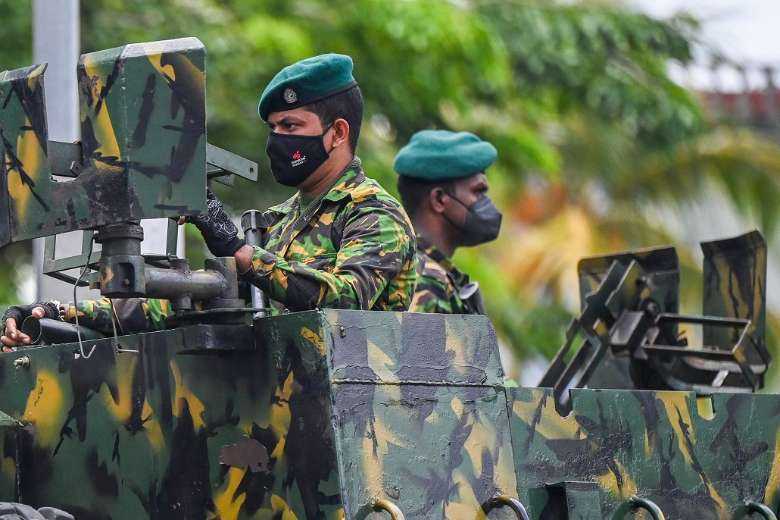
Soldiers man an armored vehicle near a check point in Colombo on May 11. Sri Lankan police have been ordered to go on the offensive and use live ammunition to stop rioting after another night of sporadic arson attacks. (Photo: AFP)
CIVICUS, the global civil society alliance, has urged Sri Lankan security forces to refrain from using excessive force and to prevent further deaths and injuries amid increasing violence around protests and guarantee a safe and enabling space for peaceful protesters to voice their concerns.
Anti-government protests calling for the resignation of President Gotabaya Rajapaksa began in early March due to the worsening economy. Civil society has documented numerous human rights violations by the government against protesters, including the use of a state of emergency to curb demonstrations and arbitrary arrests of protesters, restrictions on internet access and social media platforms, and violence against journalists who cover the protests.
On May 6, under the pretext of maintaining law and order, the government imposed another state of emergency, deployed the military and imposed a nationwide curfew.
According to reports, at least eight people have died and more than 200 people have been wounded since May 9. Some were injured by pro-government mobs, while others when police fired tear gas into crowds. There have also been reports of the looting of public property and attacks on the houses of politicians. In a bid to quell the protests, security forces have been ordered to shoot lawbreakers on sight.
“The government must immediately send clear instructions to the security forces to avoid any excessive use of force. Should any acts of violence occur, the police should ensure that those who are protesting peacefully are able to continue to do so, and not use the violent acts as a pretext to restrict or impede the exercise of civic freedoms,” said Josef Benedict, Asia Pacific researcher of CIVICUS.
“We are also concerned about reports that the government used excessive force, including of tear gas, against student protesters from the Inter University Students' Federation in front of the parliament building on May 5. At least 12 protesters were arrested.
The rights body has documented how the Rajapaksa administration has led an assault on civic space and fundamental freedoms since the president assumed power more than two years ago
“The security forces must guarantee the rights to freedom of expression and assembly of protesters. Once the situation has calmed, the authorities must conduct independent and impartial inquiries into the violence and prosecute those responsible, including police officers.”
As party to the International Covenant on Civil and Political Rights, the Sri Lankan government has the duty to respect, protect and fulfil fundamental freedoms enshrined under the treaty. This includes the right to freedom of expression and peaceful assembly. Any use of force must only be the minimum necessary, targeted at specific individuals, and proportionate to the threat posed.
CIVICUS has also urged the government to immediately lift the state of emergency that imposes restrictions on protests. International law strictly regulates attempts by governments to suspend or otherwise derogate from human rights on the grounds of emergency. Measures of derogation may only be taken to the extent necessary to meet a specific threat to the life of the nation.
The rights body has documented how the Rajapaksa administration has led an assault on civic space and fundamental freedoms since the president assumed power more than two years ago.
This includes imposing a ban on all protests under the pretext of Covid-19, arbitrary arrests of peaceful protesters and activists using the draconian Prevention of Terrorism Act, as well as criminalizing dissenters. In March, UN High Commissioner for Human Rights Michelle Bachelet similarly reported to the Human Rights Council that “the government’s response to criticism has constricted democratic and civic space.”


